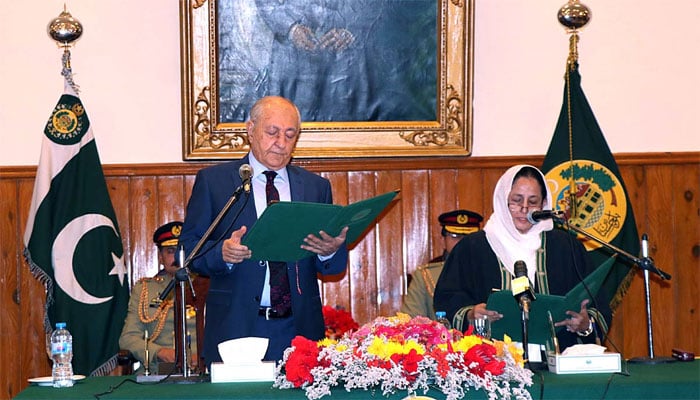Tahira Safdar sworn in as first female chief justice of BHC
The Balochistan High Court (BHC) Chief Justice Syeda Tahira Safdar took oath of her office on Saturday.The Governor Balochistan, Muhammad Khan Achakzai, administered oath to the chief justice at a ceremony in the provincial capital. The ceremony was attended by the outgoing BHC chief justice Muhammad Noor Meskanzai, judges of the high court, high-ranking officials and members of the legal fraternity.
QUETTA: The Balochistan High Court (BHC) Chief Justice Syeda Tahira Safdar took oath of her office on Saturday.The Governor Balochistan, Muhammad Khan Achakzai, administered oath to the chief justice at a ceremony in the provincial capital. The ceremony was attended by the outgoing BHC chief justice Muhammad Noor Meskanzai, judges of the high court, high-ranking officials and members of the legal fraternity.
Justice Tahira Safdar has become the first woman to be appointed the chief justice of any high court in Pakistan. The Chief Justice of Pakistan, Mian Saqib Nisar, had given the go-ahead to her appointment as the BHC chief justice. Tahira Safdar was born to a renowned lawyers’ family on October 5, 1957, in Quetta. She received her basic education from the Cantonment Public School and went to complete her Bachelor’s degree from the Government Girls College. She did her Master’s in Urdu Literature from the University of Balochistan, and completed her degree in law from the University Law College, Quetta, in 1980.
Tahira Safdar emerged successful in a competitive examination held by the Balochistan Public Service Commission, and started her career as a civil judge on April 22, 1982. She was promoted as a senior civil judge on June 29, 1987, and as an additional district and sessions judge on February 27, 1991. On March 1, 1996, she was promoted as district and sessions judge before being elevated to BHC as additional judge on September 7, 2009, and was confirmed on May 11, 2011.
Justice Tahira Safdar is one of the three judges of the Special Court constituted under Section 4 Criminal Law Amendment (Special Court) Act 1976, for trial of high treason against ex-president General Parvaiz Musharraf.
-
 Cardi B Finally Responds To Accusations About Destroying 'SNL' Set After Nicki Minaj Joke
Cardi B Finally Responds To Accusations About Destroying 'SNL' Set After Nicki Minaj Joke -
 Gorton And Denton By-election Result: Green Party Defeats Labour In Blow To Keir Starmer
Gorton And Denton By-election Result: Green Party Defeats Labour In Blow To Keir Starmer -
 Jack Dorsey Cuts 4,000 Roles, Says AI Requires Smaller Teams
Jack Dorsey Cuts 4,000 Roles, Says AI Requires Smaller Teams -
 Reggie Bannister Health Takes ‘difficult Turn’ Amid Dementia, Parkinson’s Battle
Reggie Bannister Health Takes ‘difficult Turn’ Amid Dementia, Parkinson’s Battle -
 'Humble Traitor' Rob Rausch Makes Unexpected Move After Betraying Maura Higgins In Season 4
'Humble Traitor' Rob Rausch Makes Unexpected Move After Betraying Maura Higgins In Season 4 -
 Sarah Ferguson Drops An Accusation Against Andrew? ‘He Just Wants Leverage’
Sarah Ferguson Drops An Accusation Against Andrew? ‘He Just Wants Leverage’ -
 Anthropic Rejects Pentagon Military AI Proposal, Holds Firm On Safety Guardrails —What’s Next?
Anthropic Rejects Pentagon Military AI Proposal, Holds Firm On Safety Guardrails —What’s Next? -
 'Traitors' Reunion Drama: Rob Rausch Defends Strategy, Makes Shocking Revelation After Victory
'Traitors' Reunion Drama: Rob Rausch Defends Strategy, Makes Shocking Revelation After Victory -
 Inside Hillary Clinton’s Epstein Testimony: Key Takeaways And Highlights Explained
Inside Hillary Clinton’s Epstein Testimony: Key Takeaways And Highlights Explained -
 'Too Hard To Be Without’: Woman Testifies Against Instagram And YouTube
'Too Hard To Be Without’: Woman Testifies Against Instagram And YouTube -
 Kendall Jenner Recalls Being ‘too Stressed’: 'I Want To Focus On Myself'
Kendall Jenner Recalls Being ‘too Stressed’: 'I Want To Focus On Myself' -
 Ethel Kennedy’s 34 Grandchildren And The Expanding Kennedy Family Legacy
Ethel Kennedy’s 34 Grandchildren And The Expanding Kennedy Family Legacy -
 Dolly Parton Achieves Major Milestone For Children's Health Advocacy
Dolly Parton Achieves Major Milestone For Children's Health Advocacy -
 'The White Lotus' Creator Mike White Calls 'Survivor' Fans 'sadistic'
'The White Lotus' Creator Mike White Calls 'Survivor' Fans 'sadistic' -
 Oilers Vs Kings: Darcy Kuemper Pulled After Allowing Four Goals In Second Period
Oilers Vs Kings: Darcy Kuemper Pulled After Allowing Four Goals In Second Period -
 Calgary Weather Warning As 30cm Snow And 130 Km/h Winds Expected
Calgary Weather Warning As 30cm Snow And 130 Km/h Winds Expected




